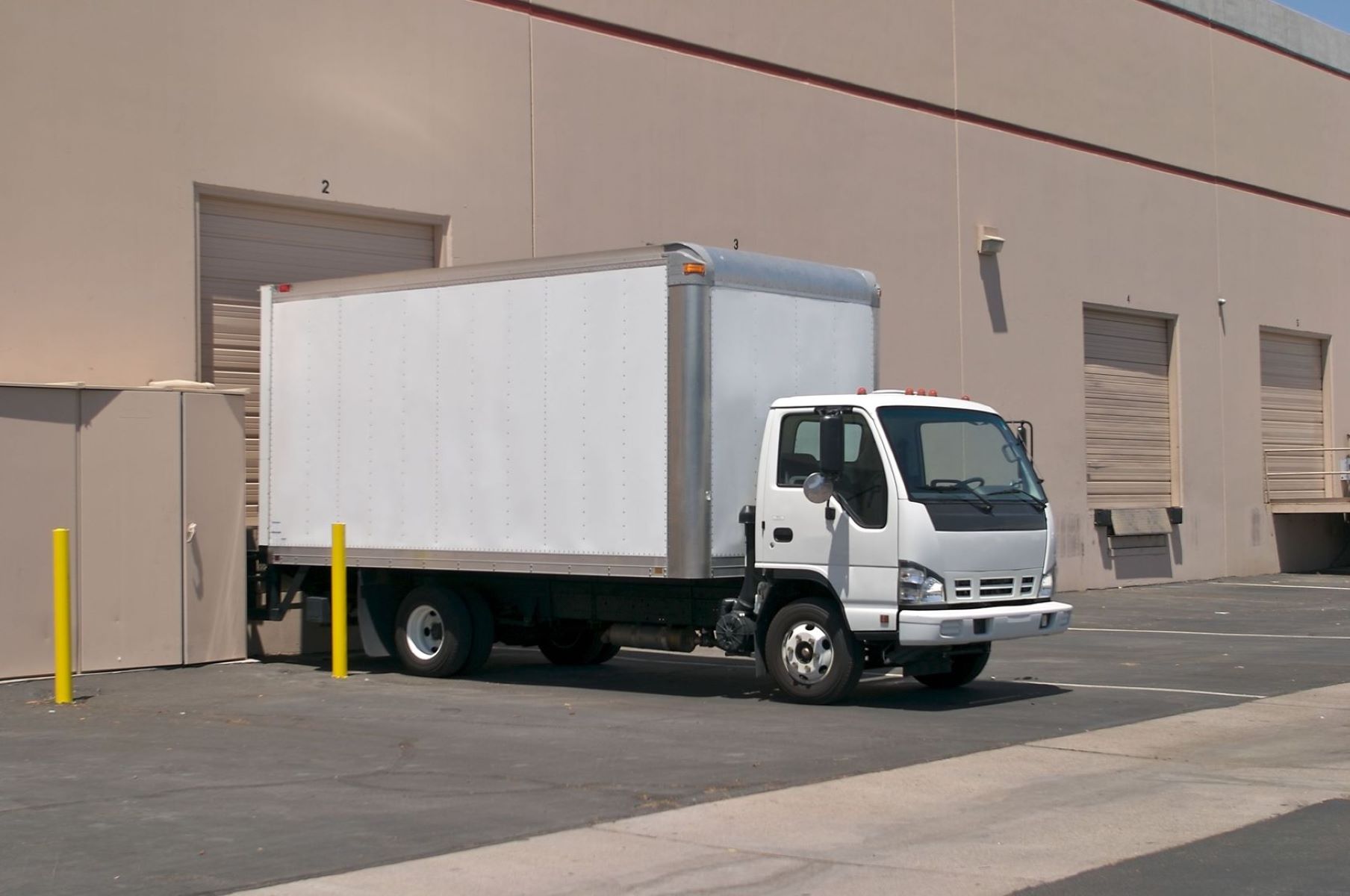Home>Business and Finance>How To Start A Successful Box Truck Company In Houston, Texas: A Step-by-Step Guide


Business and Finance
How To Start A Successful Box Truck Company In Houston, Texas: A Step-by-Step Guide
Published: January 27, 2024
Learn how to launch a thriving box truck business in Houston, Texas with our comprehensive step-by-step guide. Get expert tips for success in the competitive business and finance landscape.
(Many of the links in this article redirect to a specific reviewed product. Your purchase of these products through affiliate links helps to generate commission for Regretless.com, at no extra cost. Learn more)
Table of Contents
Introduction
Starting a successful box truck company in Houston, Texas can be an exciting and rewarding venture. With the city's thriving economy and bustling commercial activities, there is a growing demand for reliable transportation and logistics services. Whether you are an aspiring entrepreneur or an experienced business owner looking to expand into the transportation industry, launching a box truck company in Houston presents a promising opportunity.
In this comprehensive guide, we will walk you through the essential steps and strategies to establish and grow a profitable box truck business in the vibrant city of Houston. From conducting thorough research and planning to navigating the legal and regulatory requirements, acquiring the right box truck, obtaining necessary permits and licenses, setting up efficient operations, implementing effective marketing and branding initiatives, managing finances, and hiring and training employees, we will provide you with valuable insights and practical tips to help you build a successful box truck company from the ground up.
As you embark on this entrepreneurial journey, it's crucial to understand the dynamic landscape of the transportation and logistics industry in Houston. By staying informed about the market trends, consumer preferences, and industry regulations, you can position your box truck company for long-term success and sustainability. Additionally, embracing innovation, leveraging technology, and prioritizing exceptional customer service will be instrumental in differentiating your business and establishing a strong reputation within the competitive transportation sector.
Whether your goal is to cater to local businesses, offer last-mile delivery services, or provide specialized transportation solutions, the potential for growth and profitability in the box truck industry in Houston is substantial. By following the step-by-step guidance outlined in this article and leveraging the opportunities presented by the city's thriving economy, you can lay a solid foundation for your box truck company and embark on a rewarding entrepreneurial journey in one of the most dynamic business environments in the United States.
Step 1: Research and Planning
Before diving into the intricacies of launching a box truck company in Houston, thorough research and meticulous planning are essential to set the stage for success. This initial step lays the foundation for informed decision-making and strategic execution, guiding you through the complexities of the transportation and logistics industry while helping you identify opportunities and mitigate potential challenges.
Market Analysis
Conducting a comprehensive market analysis is crucial to gain insights into the demand for transportation and logistics services in Houston. Evaluate the current market dynamics, assess the competition, and identify underserved niches or unmet needs within the industry. Understanding the specific requirements of local businesses, manufacturers, retailers, and consumers will enable you to tailor your services to address their transportation needs effectively.
Business Model Development
Define your business model by outlining the types of transportation services you intend to offer, such as local delivery, long-haul transportation, or specialized logistics solutions. Determine your target market, pricing strategies, and potential revenue streams. Additionally, consider the operational aspects of your box truck company, including fleet size, maintenance requirements, and scalability.
Regulatory Compliance
Research the legal and regulatory requirements governing the transportation industry in Houston. Familiarize yourself with licensing, insurance, and safety standards to ensure compliance with state and federal regulations. Understanding the legal framework and industry standards will help you establish a solid operational framework and mitigate potential risks.
Financial Projections
Develop comprehensive financial projections to estimate the initial investment required to launch your box truck company. Factor in expenses such as vehicle acquisition, insurance, fuel, maintenance, and personnel costs. Additionally, forecast your revenue potential based on market demand and pricing strategies. Conducting thorough financial planning will provide clarity on the capital needed to initiate and sustain your operations.
Risk Assessment
Identify potential risks and challenges that may impact your box truck business, such as fluctuating fuel prices, regulatory changes, or market saturation. Formulate risk mitigation strategies to anticipate and address these challenges effectively, ensuring the resilience and sustainability of your venture.
By meticulously researching the market landscape, analyzing industry trends, and developing a robust business plan, you can lay a solid groundwork for your box truck company in Houston. This strategic approach will empower you to make informed decisions and position your business for long-term growth and success in the dynamic transportation and logistics sector.
Step 2: Legal and Business Requirements
Navigating the legal and business requirements is a critical phase in establishing a box truck company in Houston, Texas. Complying with the regulatory framework and fulfilling the necessary administrative obligations is essential to ensure the legitimacy and smooth operation of your transportation business.
Business Entity Formation
The first step in meeting legal requirements involves selecting the appropriate business structure for your box truck company. Options include sole proprietorship, partnership, limited liability company (LLC), or corporation. Each structure has distinct implications for taxation, liability, and operational flexibility. Consulting with a business attorney or a certified public accountant (CPA) can provide valuable guidance in choosing the most suitable entity type for your specific needs and long-term business goals.
Registration and Licensing
Registering your box truck company with the State of Texas and obtaining the requisite business licenses and permits are fundamental legal obligations. The Texas Secretary of State's office provides comprehensive information on the registration process, ensuring compliance with state regulations. Additionally, you will need to secure a Motor Carrier Number (MC Number) from the Federal Motor Carrier Safety Administration (FMCSA) to operate as a for-hire carrier in interstate commerce. Understanding and fulfilling these licensing requirements is crucial to legally commence and sustain your transportation operations.
Insurance Coverage
Securing adequate insurance coverage is a non-negotiable aspect of operating a box truck company. Commercial auto insurance, cargo insurance, and liability coverage are essential to protect your business, assets, and the goods being transported. Compliance with insurance mandates not only safeguards your business from potential liabilities but also fosters trust and confidence among your clients and partners.
Tax Obligations
Understanding and fulfilling tax obligations is paramount for the financial health and legal compliance of your box truck company. This includes obtaining an Employer Identification Number (EIN) from the Internal Revenue Service (IRS), adhering to state and federal tax regulations, and accurately reporting and remitting taxes. Consulting with a tax professional can provide invaluable insights into tax planning, compliance, and optimizing your business's financial structure.
By diligently addressing legal and business requirements, you can establish a solid legal foundation and ensure the smooth and compliant operation of your box truck company. Adhering to regulatory standards, obtaining the necessary licenses and insurance, and fulfilling tax obligations will position your business for sustained growth and long-term success in Houston's vibrant transportation and logistics landscape.
Step 3: Acquiring a Box Truck
Acquiring the right box truck is a pivotal step in establishing your transportation business in Houston. The box truck, also known as a straight truck or cube van, serves as the primary asset for transporting goods, making it essential to select a reliable and well-suited vehicle to meet the demands of your operations.
Read more: How To Draw A Truck
Vehicle Selection
When choosing a box truck, consider factors such as cargo capacity, fuel efficiency, maneuverability, and maintenance costs. Assess the size and weight of typical cargo you intend to transport to determine the appropriate truck dimensions and payload capacity. Additionally, evaluate the vehicle's fuel economy and emissions standards to optimize operational efficiency and environmental sustainability. Selecting a well-maintained and durable box truck will contribute to the reliability and longevity of your transportation fleet.
New vs. Used Trucks
Decide whether to invest in a new or used box truck based on your budget, long-term business strategy, and specific operational requirements. While a new truck offers the latest features and warranties, a used truck may provide cost savings and flexibility in terms of customization and initial investment. Conduct thorough inspections and vehicle history checks when considering used trucks to ensure their roadworthiness and compliance with safety standards.
Financing and Acquisition
Explore financing options such as commercial vehicle loans, equipment leasing, or dealership financing to acquire your box truck. Compare interest rates, repayment terms, and eligibility criteria from various lenders to secure the most favorable financing arrangement. Additionally, consider purchasing from reputable dealerships or certified sellers to ensure the quality and reliability of the vehicle. Negotiate the purchase price and warranty terms to secure a competitive deal that aligns with your budget and operational needs.
Customization and Branding
Customize the box truck to align with your branding and operational requirements. Incorporate your company logo, contact information, and branding elements onto the vehicle's exterior to enhance visibility and brand recognition. Additionally, outfit the interior of the box truck with cargo securing mechanisms, temperature control systems (if applicable), and organizational features to optimize cargo management and ensure the safe and efficient transport of goods.
By carefully evaluating your box truck options, securing favorable financing, and customizing the vehicle to reflect your brand identity, you can acquire a reliable and well-equipped box truck to power your transportation operations in Houston. A strategically chosen and properly outfitted box truck will not only support the seamless delivery of goods but also serve as a visible representation of your professional and reliable transportation services within the bustling cityscape of Houston, Texas.
Step 4: Securing Permits and Licenses
Securing the necessary permits and licenses is a crucial step in the process of establishing a box truck company in Houston, Texas. Compliance with regulatory requirements and obtaining the appropriate authorizations are imperative to ensure the legal operation and credibility of your transportation business.
Motor Carrier Authority
One of the primary permits you will need to secure is the Motor Carrier Authority, also known as the Operating Authority, issued by the Federal Motor Carrier Safety Administration (FMCSA). This authorization is essential for engaging in interstate commerce as a for-hire carrier. The application process involves submitting detailed information about your business, including proof of insurance, designated process agents, and adherence to safety regulations. Acquiring Motor Carrier Authority demonstrates your commitment to safety and regulatory compliance, instilling confidence in your clients and partners.
Commercial Driver's License (CDL)
If you or your employees will be operating the box trucks, obtaining a Commercial Driver's License (CDL) is mandatory. The Texas Department of Public Safety oversees the issuance of CDLs, which require applicants to pass written knowledge tests, practical driving examinations, and meet medical fitness standards. Ensuring that your drivers possess valid CDLs demonstrates your commitment to safety and professionalism, essential qualities in the transportation industry.
Vehicle Registration and Permits
Registering your box trucks and obtaining the necessary vehicle permits from the Texas Department of Motor Vehicles (TxDMV) is essential for legal operation within the state. This process involves providing vehicle documentation, proof of ownership, and payment of registration fees. Additionally, specialized permits may be required for specific types of cargo or oversized vehicles. Ensuring full compliance with vehicle registration and permitting requirements is vital to avoid potential legal repercussions and maintain uninterrupted operations.
City-Specific Requirements
Depending on the specific operational areas within Houston, additional city-specific permits or licenses may be necessary. This could include business permits, zoning clearances, or parking permits for commercial vehicles. Familiarizing yourself with the local ordinances and requirements in the areas where you intend to conduct business will ensure full compliance and a seamless operational setup within the city.
By diligently navigating the process of securing permits and licenses, you can establish a legally compliant and operationally sound foundation for your box truck company in Houston. Adhering to regulatory standards, obtaining the necessary authorizations, and ensuring that your drivers and vehicles are properly licensed and permitted will position your business for sustained growth and long-term success in Houston's dynamic transportation and logistics landscape.
Step 5: Setting Up Operations
Setting up efficient and streamlined operations is pivotal to the success of your box truck company in Houston, Texas. From route planning and scheduling to establishing effective communication channels and implementing robust logistical processes, this phase is essential for ensuring the smooth and reliable transportation of goods while optimizing operational efficiency.
Route Optimization and Scheduling
Efficient route planning is essential to minimize fuel consumption, reduce transit times, and enhance overall productivity. Leverage modern route optimization software and GPS technologies to identify the most efficient delivery routes based on factors such as traffic conditions, delivery windows, and geographic considerations. Implementing a structured scheduling system that accounts for pickup and delivery times, driver availability, and customer preferences will help maximize the utilization of your box trucks while meeting client expectations.
Fleet Maintenance and Management
Establishing a proactive maintenance schedule for your box truck fleet is crucial to ensuring vehicle reliability and longevity. Regular inspections, servicing, and adherence to preventive maintenance protocols will minimize downtime and mitigate the risk of unexpected breakdowns. Implementing a robust fleet management system to track vehicle performance, fuel consumption, and maintenance records will provide valuable insights into operational efficiency and facilitate informed decision-making.
Communication and Tracking Systems
Implementing effective communication channels and real-time tracking systems is essential for maintaining visibility and control over your transportation operations. Utilize mobile communication devices, such as GPS-enabled smartphones or two-way radios, to facilitate seamless communication between drivers, dispatchers, and clients. Integrating GPS tracking technology into your box trucks enables real-time monitoring of vehicle locations, ensuring accurate delivery tracking and proactive response to any unforeseen circumstances.
Safety and Compliance Protocols
Prioritizing safety and regulatory compliance is paramount in the transportation industry. Establish comprehensive safety protocols and training programs for your drivers, emphasizing defensive driving techniques, cargo handling procedures, and adherence to traffic laws. Regularly review and update safety protocols to align with industry best practices and regulatory requirements. Additionally, ensure that your operations comply with environmental standards and sustainability initiatives, fostering a responsible and eco-conscious approach to transportation.
Customer Service and Satisfaction
Delivering exceptional customer service is a cornerstone of building a reputable box truck company. Emphasize professionalism, reliability, and responsiveness in your interactions with clients. Implement feedback mechanisms to gather insights into customer satisfaction and service quality, allowing you to continually improve and refine your operations based on client feedback.
By meticulously setting up and optimizing your operations, you can establish a robust and efficient framework for your box truck company in Houston. Implementing advanced technologies, prioritizing safety and customer satisfaction, and fostering a culture of operational excellence will position your business for sustained growth and success in the competitive transportation landscape of Houston, Texas.
Step 6: Marketing and Branding
Marketing and branding play a pivotal role in establishing and growing a successful box truck company in Houston, Texas. Effectively promoting your transportation services and cultivating a strong brand identity are essential for attracting clients, differentiating your business, and fostering long-term customer relationships.
Read more: How To Start A Staffing Agency
Targeted Marketing Strategies
Identify your target market segments within Houston's diverse business landscape, such as retail, manufacturing, e-commerce, and local businesses. Tailor your marketing strategies to address the specific transportation needs and pain points of these sectors. Utilize digital marketing channels, including social media, search engine optimization (SEO), and targeted online advertising, to increase your visibility and reach potential clients. Additionally, consider participating in industry-specific trade shows, networking events, and business expos to showcase your services and establish valuable connections within the local business community.
Brand Identity and Differentiation
Develop a compelling brand identity that reflects the reliability, professionalism, and efficiency of your box truck company. Create a distinctive logo, visual assets, and brand messaging that resonate with your target audience and convey the unique value proposition of your transportation services. Emphasize key differentiators, such as on-time deliveries, personalized customer service, or specialized logistics capabilities, to position your brand as a preferred choice in the competitive transportation market.
Client Relationship Building
Prioritize building strong client relationships based on trust, transparency, and reliability. Communicate proactively with clients, providing updates on delivery statuses, addressing inquiries promptly, and demonstrating a commitment to exceeding their expectations. Implement customer loyalty programs, referral incentives, and personalized service offerings to nurture long-term partnerships and foster client loyalty. Positive word-of-mouth referrals and client testimonials can significantly enhance your brand reputation and attract new business opportunities.
Industry Partnerships and Collaborations
Forge strategic partnerships with complementary businesses, such as warehouses, distribution centers, or logistics providers, to expand your service capabilities and reach new client segments. Collaborate with local businesses and industry associations to participate in joint marketing initiatives, sponsorships, or community events, positioning your brand as an active and engaged participant in the Houston business community. Leveraging synergistic partnerships can amplify your marketing reach and enhance brand visibility within the transportation and logistics ecosystem.
Online Presence and Reputation Management
Establish a professional and informative online presence through a well-designed website, engaging content, and active participation in industry forums and online directories. Solicit and showcase positive client reviews and testimonials to build trust and credibility among potential clients. Monitor and manage your online reputation proactively, addressing any negative feedback or concerns promptly and transparently. A positive online reputation is integral to establishing your brand as a reputable and trustworthy transportation partner in Houston.
By implementing targeted marketing strategies, cultivating a compelling brand identity, nurturing client relationships, leveraging strategic partnerships, and maintaining a strong online presence, you can effectively position your box truck company for visibility, growth, and success in the competitive transportation market of Houston, Texas.
Step 7: Managing Finances
Effective financial management is a cornerstone of building a sustainable and profitable box truck company in Houston, Texas. From budgeting and cash flow management to strategic investment decisions, prudent financial practices are essential for ensuring the long-term viability and growth of your transportation business.
Budgeting and Expense Control
Developing a comprehensive budget that encompasses both operational and capital expenses is fundamental to maintaining financial stability. Identify and categorize recurring costs such as fuel, maintenance, insurance, and personnel expenses, while also accounting for variable expenses related to vehicle repairs, regulatory compliance, and marketing initiatives. Implementing stringent expense control measures and regularly reviewing budget performance will help optimize resource allocation and minimize unnecessary expenditures.
Cash Flow Management
Maintaining healthy cash flow is critical for sustaining day-to-day operations and facilitating business growth. Monitor cash inflows and outflows diligently, ensuring that revenue from client invoices aligns with payment cycles and operational expenses. Implement efficient invoicing and collection processes to minimize payment delays and mitigate cash flow disruptions. Additionally, establishing contingency reserves to address unforeseen expenses or market fluctuations will enhance financial resilience.
Read more: How To Start A Car Without Key
Financial Reporting and Analysis
Regularly analyze financial reports to gain insights into the financial health and performance of your box truck company. Profit and loss statements, balance sheets, and cash flow statements provide valuable metrics for assessing revenue trends, expense patterns, and overall profitability. Utilize financial analysis to identify areas for cost optimization, revenue enhancement, and strategic investment opportunities, enabling informed decision-making and proactive financial management.
Tax Planning and Compliance
Navigating tax obligations and compliance requirements is integral to maintaining the financial integrity of your transportation business. Engage with tax professionals to develop tax planning strategies that optimize deductions, credits, and incentives while ensuring full compliance with state and federal tax regulations. Stay abreast of tax law changes and regulatory updates that may impact your business, proactively adjusting your financial strategies to align with evolving tax landscapes.
Strategic Investment and Growth
Strategically allocating resources for business growth and expansion is a pivotal aspect of financial management. Evaluate investment opportunities such as fleet expansion, technology upgrades, or service diversification to enhance your competitive positioning and revenue potential. Conduct thorough cost-benefit analyses and risk assessments to assess the viability and potential returns of strategic investments, fostering sustainable growth and long-term profitability.
By implementing robust financial management practices, including budgeting, cash flow optimization, financial analysis, tax planning, and strategic investment, you can establish a solid financial framework to support the growth and resilience of your box truck company in the dynamic business environment of Houston, Texas.
Step 8: Hiring and Training Employees
Hiring and training employees is a pivotal step in building a competent and cohesive team to drive the operations and growth of your box truck company in Houston, Texas. From recruiting skilled drivers and logistics personnel to providing comprehensive training programs, this phase is critical for fostering a culture of professionalism, safety, and operational excellence within your organization.
Read more: How To Start A Fire In A Fire Pit
Recruitment and Selection
Identify and recruit individuals with a strong track record in commercial driving, logistics, and transportation operations. Seek candidates who demonstrate a commitment to safety, reliability, and customer service. Utilize targeted recruitment channels, including online job boards, industry associations, and local networking events, to attract qualified talent. Implement a rigorous selection process that includes driving assessments, background checks, and thorough evaluations of candidates' driving records and professional credentials.
Training and Certification
Develop comprehensive training programs that encompass defensive driving techniques, cargo handling protocols, and adherence to safety regulations. Ensure that all drivers possess the necessary Commercial Driver's Licenses (CDL) and maintain a strong focus on ongoing compliance with state and federal transportation regulations. Provide specialized training for handling specific types of cargo, navigating urban delivery routes, and utilizing advanced vehicle technologies. Additionally, prioritize training on customer interaction, emphasizing professionalism and service excellence.
Safety Protocols and Procedures
Instill a culture of safety and accountability within your workforce by implementing robust safety protocols and procedures. Emphasize the importance of pre-trip inspections, adherence to traffic laws, and proactive risk mitigation strategies. Conduct regular safety meetings and refresher training sessions to reinforce safety best practices and address emerging industry trends. Encourage open communication channels for employees to report safety concerns and contribute to the continuous improvement of safety protocols.
Professional Development and Advancement
Support the professional development and career advancement of your employees by offering opportunities for additional certifications, advanced training programs, and leadership development initiatives. Recognize and reward outstanding performance, fostering a positive work environment and a sense of pride in contributing to the success of the company. Encourage ongoing feedback and dialogue to understand employee needs and aspirations, aligning their professional growth with the strategic objectives of the business.
Team Building and Cohesion
Facilitate team-building activities and collaborative initiatives to foster a cohesive and supportive work environment. Encourage open communication, mutual respect, and a shared commitment to the company's mission and values. Cultivate a culture of teamwork and camaraderie, recognizing the collective contributions of employees in delivering exceptional service and upholding the reputation of the company.
By prioritizing the recruitment of skilled professionals, implementing comprehensive training programs, emphasizing safety and professionalism, and fostering a supportive work culture, you can build a highly capable and motivated team to drive the success of your box truck company in Houston. Investing in the hiring and training of employees is not only essential for operational efficiency but also for cultivating a strong organizational foundation that aligns with the long-term vision and growth of your transportation business.
Conclusion
Embarking on the journey to establish a successful box truck company in Houston, Texas, requires a strategic blend of meticulous planning, operational excellence, and a customer-centric approach. Throughout the comprehensive steps outlined in this guide, the focus has been on laying a resilient foundation for your transportation business while embracing the dynamic opportunities presented by the vibrant business landscape of Houston.
From conducting thorough research and market analysis to navigating the legal and regulatory requirements, acquiring the right box truck, securing permits and licenses, setting up efficient operations, implementing effective marketing and branding initiatives, managing finances, and hiring and training employees, each phase of the entrepreneurial process contributes to the holistic development and sustainability of your box truck company.
As you move forward with the implementation of these essential steps, it is imperative to remain adaptable and responsive to the evolving needs of the transportation and logistics industry. Embracing technological advancements, fostering a culture of safety and professionalism, and prioritizing exceptional customer service will be instrumental in differentiating your box truck company and establishing a strong foothold in the competitive market of Houston.
Furthermore, leveraging strategic partnerships, staying informed about industry trends, and actively participating in the local business community will position your business as a trusted and reliable transportation partner in the bustling cityscape of Houston. By aligning your operational strategies with the unique demands and opportunities within the local market, you can cultivate a competitive edge and build enduring relationships with clients and industry stakeholders.
As you navigate the intricacies of launching and growing your box truck company, remember that resilience, adaptability, and a customer-centric ethos are the cornerstones of sustainable success in the transportation and logistics sector. By integrating the insights and strategies outlined in this guide with your entrepreneurial vision and dedication, you can chart a course towards establishing a thriving and prosperous box truck company in the dynamic business environment of Houston, Texas.




